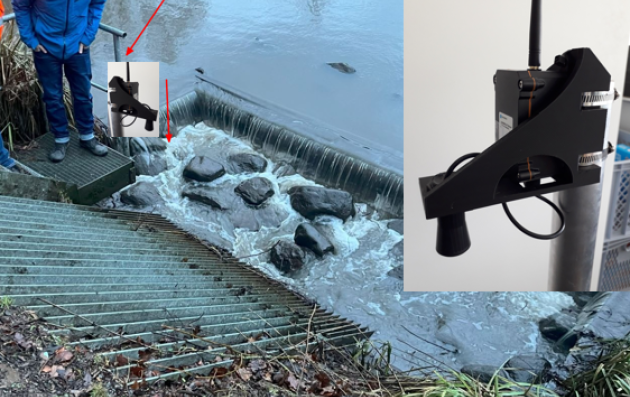Date of label : 29/10/2024
-
KielRegion , Germany
-
Size of city : 650.000 inhabitants

A water monitoring or measurement setup at a small dam or weir on a river.
Summary
The Smart water measurement project in the Kiel Region (DE) aims to forecast extreme weather events and monitor water levels in various use cases. Using sensor technology, the project team creates a data set that simplifies planning on the part of the authorities and makes existing rainwater retention basins digitally mappable. The practice supports sustainable, digital and participatory urban development, by focusing on creating a regional data infrastructure, and informing and involving key stakeholders.
The solutions offered by the Good Practice
The practice is part of the ‘Smart Cities made in Germany’ initiative funded by the Federal Ministry of Housing, Urban Development and Building, to support integrated urban development and the digital transformation in the KielRegion.
Climate change is increasing extreme weather events that heavily impact urban areas, such as heavy rainfall and extreme droughts. Sensor technology provides the data for the models used by planners to forecast these scenarios, and by decision-makers to make appropriate responses.
The practice uses sensors to digitally monitor the condition of fire ponds (used to extinguish fires), rainwater retention basins, and other watercourses. Planning approaches such as the sponge city model can actively be supported with such data. The strategy paper of the Smart KielRegion, which was developed from a broad participation process, serves as the basis for the practice.
Already piloted at two locations, the project is to be expanded to more sites in the region, to gain further insights and create a database for decision-making processes and informing citizens.
Building on the sustainable and integrated urban approach
The smart water measurement practice builds on previous efforts on this topic, and will continue to exchange experiences with other municipalities facing similar conditions.
There is already an exchange with local authorities who are interested in expanding and operating the project. It addresses a real societal problem, with environmental causes (climate change amplified heavy rainfall events) that already have a high social impact. This was also reflected in the participation phase with citizens and stakeholders.
Based on participatory approach
The Smart water measurement project is strongly supported by the public and regional experts. Over 2 000 people contributed suggestions during a two-year participation phase, including citizens, administration officials, politicians, and regional stakeholders such as associations, scientific institutions and company representatives.
This process was accompanied by an interdisciplinary forum with experts from the region, and several stakeholder workshops to gather further input. Important stakeholders are the local civil engineering offices, the water authority, and the sewerage companies.
Residents from across the KielRegion were invited to various locations, in various formats (in person or online), to actively participate in shaping the region. As a result, the needs of the people in the KielRegion were identified. All the input was used to develop measures to benefit everyone.
What difference has it made?
The KielRegion, including the state capital Kiel and the districts of Rendsburg-Eckernförde and Plön, is home to around 650 000 people. Its unique location, with densely-populated urban areas, rural areas, a coastline of over 130 kilometres, two fjords, and one of the world’s busiest shipping lanes (Kiel Canal), makes the topic of climate adaptation highly relevant. Extreme weather events already cause coastal flooding, which has been difficult to predict and control. Rainwater retention basins have limited capacity, and drainage systems have to be checked manually for blockages. Droughts also have a strong influence on the groundwater level.
Thanks to smart water measurement, such events can be better predicted, by linking weather models with sensor measurements, and timely and appropriate measures can be initiated. The continuous monitoring of water levels in rainwater retention basins also relieves the burden on the responsible agencies. Demographic change, and a subsequent shortage of skilled workers among project partners, makes the optimisation of processes essential. There is already close cooperation with the local civil engineering offices, the water authority and the sewerage companies, which is to be intensified and extended to other locations in the future.
Why this Good Practice should be transferred to other cities
Many European cities face the same challenges, which must be taken into account in their future development. The New Leipzig Charter, promoting integrated urban development, is the basis for smart water measurement. The approach encourages citizens to shape their city’s sustainable development through active participation. The Urban Agenda for the EU prioritises climate adaptation and digital transformation, both highly relevant to the practice, thereby providing a basis for actions applicable to other European cities.
The practice is part of the Smart City programme of the German Federal Ministry of Housing, Urban Development and Building, which focuses on the digital transformation of European cities. The programme aims to create recommendations for actions and guidelines to ensure a transfer to other cities. Individual development steps of the practice are monitored to identify possible problems and to share solutions in transferable recommendations. In the Smart Cities context, the Coordination and Transfer Office publishes the results of the funded cities, and also makes them available to non-funded cities in its “start smart” initiative to facilitate transfer.
Key to transferring the practice is documenting the challenges and possible solutions, with recommendations made publicly available, based on open-source guidelines, to reduce entry barriers.
As part of the practice, fire ponds and a rainwater retention basin have already been equipped with sensors and a dashboard at a pilot site. Threshold values have been determined which, if exceeded, send an automated message to the responsible authority. The experiences from this pilot site are to be transferred to other sites in the region during the course of the project, in order to define clear guidelines for transferring the practice.
To read more about the Smart water measurement practice, visit the project website (in German): Neighbourhood Development - KielRegion
